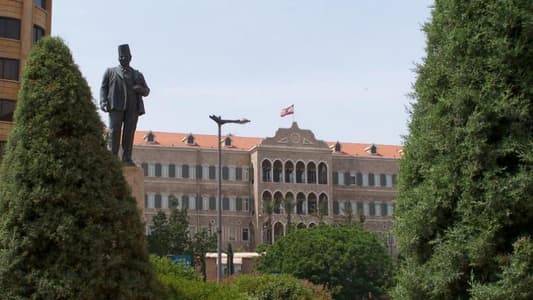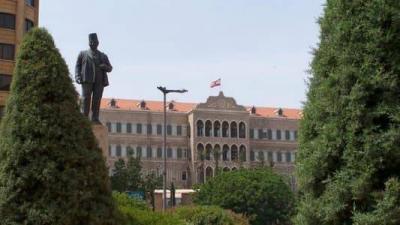After caretaker Prime Minister Najib Mikati called his cabinet to a session next Monday, there are new rules for the game that has been ongoing since the end of President Michel Aoun's term. The convening of the session and its ability to make decisions is just the beginning. Although this is the first call for the caretaker cabinet since its de facto resignation last May, the urgent nature of the meeting reflects a renewed push in the ongoing struggle surrounding the three dysfunctional constitutional institutions: the presidency, the executive authority, and the legislative authority. The content of this invitation goes beyond breaking the cycle of stagnation; it is closer to a redistribution of roles and power dynamics, changing established rules. The urgency is merely a pretext for immediate gains first and setting a precedent.
Next Wednesday, President Najib Mikati will leave Beirut and be absent from the country until Sunday, while the following week paves the way for a holiday break that will extend beyond the New Year. This is the logical calendar to send two urgent messages: First, that the caretaker government's meeting aims to address urgent living and social issues, not to mention the well-known issue of hospital dues. Second, that the session - if it is not hindered at the last minute - will provide a test for managing the next phase in a long vacancy, perhaps longer than expected.
Those familiar with the efforts leading up to the caretaker government's meeting cite several points related to the new decision: First, support from President Nabih Berri and Walid Jumblatt for the Cabinet meeting due to the necessity of addressing urgent issues that are not limited to one problem but signal the opening of subsequent meetings. Such a meeting does not deviate from Mikati's commitment to Maronite Patriarch Bechara Boutros Al-Rahi on the eve of Aoun's departure, to limit discussions - if they occur - to urgent matters that cannot be postponed. Observers of the parliamentary speaker's position sense a need to reactivate the government situation as compensation for the complete impasse on the presidential election and to try to move the authorities forward.
Secondly, the anticipated session on Monday is aware of the previously declared position of the head of the Free Patriotic Movement, MP Gibran Bassil, who has rejected the convening of the caretaker government and threatened that ministers from his party and allies will not participate in any session based on his prior challenge to the legitimacy of the meeting and the constitutionality of its decisions. However, the announcement of the invitation yesterday has, at least until Monday, allowed for the belief that what was whispered among interested parties is true: that the Prime Minister only issued the invitation after being assured that the meeting's quorum issue would not be a problem, requiring the attendance of two-thirds of the ministers. Sources indicate that any government meeting will be attended by at least 16 ministers, which constitutes two-thirds of the Cabinet as stipulated in Article 65 of the Constitution. This results in the legality of the meeting and its decisions, as well as a limited signature - contrary to the exceptional norm during the presidency of Tamam Salam in 2014 and 2016 - that involves the signature of the Prime Minister and the relevant minister or ministers.
Thirdly, the government session, which will potentially have subsequent sessions based on what issues are brought before it and its needs, is merely a preparatory step for another action that will follow depending on the success of its experience: reviving sessions of the parliament's general assembly. According to insiders on Berri's position, he is determined to pull the parliament out of the spiral of vacancy it is mired in, which has been restricted to unproductive sessions to elect a president. The speaker considers the Christian blocs, such as the Free Patriotic Movement, the Lebanese Forces, the Kataeb Party, and some independents, threatening to boycott any parliamentary session before electing a new president, which deprives their absence of the required legitimacy. In the latest efforts by Berri, 18 Christian MPs have informed him of their willingness to attend any session they are invited to.
Fourthly, it seems that disputes and internal divisions revolve around Bassil, who has raised three vetoes similar to three "no's" since the end of the previous president's term, which have been sufficient to render the three constitutional authorities ineffective: no to the nomination of Sleiman Frangieh, no to the convening of the caretaker government, and no to the parliament meeting for legislation. While the first veto took on a political dimension intertwined with personal motives, its proponent appears isolated on the second veto, and surrounded by Christian blocs - whether they wish or not - on the third veto that intersects with him in prioritizing the presidential election over anything else, and consequently boycotting parliamentary meetings. In this way, Bassil acts as if he is facing everyone and is capable of taking the initiative. Therefore, specifying Monday as the date for the government's meeting is the first attempt to break the isolation surrounding the constitutional institutions.
Fifthly, and perhaps this is indeed the crux of the puzzle, is Hezbollah's position on those three vetoes. The party shares, along with Bassil and Berri, the white card game in the sessions for electing a president, making this a cohesive bloc that is easily controlled, as evidenced by its maintenance of the minimum number of blank votes it holds. However, this sharing conceals a profound contradiction between the Shiite duo supporting Frangieh's nomination and Bassil, who not only rejects it but also opposes it. This contradiction has not yet led to a public and difficult disagreement between the party and the movement, as if the actual determination of the fate of the Zgharta leader's candidacy is postponed indefinitely, while the confrontation is currently focused on wasting time with blank votes.
Since before the end of Aoun's term, during the failed attempts to form a government, Hezbollah has disappeared from the forefront of events, except for timid communications aimed not at resolving disputes. Since then, it has taken a spectator's position without concealing its alignment with Bassil when party deputies stated that they do not encourage the convening of the caretaker government during the presidential vacancy phase. The party has also reluctantly accepted the criticisms directed at it by Bassil, especially regarding the nomination of Frangieh, and has acknowledged the confusion it causes him. Now, on the eve of Monday's session, it faces an unavoidable challenge. The participation of its two ministers in the caretaker government not only provides the necessary quorum for convening but also sends a negative message to Bassil about not following his lead in obstructing meetings, even if for urgent or exceptional reasons.




